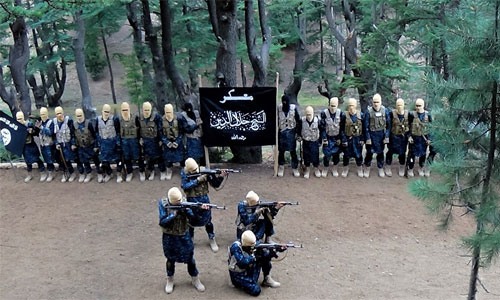The Afghan affiliate of the self-proclaimed Islamic State (IS), known as Islamic State Khorasan (ISK), has consolidated its foothold in Afghanistan despite the fact that the IS group lost its ground in Iraq and Syria.
A number of the Taliban’s discontented rank-and-file, split from the Taliban’s leadership, are believed to form the ISK and accommodated the IS fighters in Afghanistan. Members of the Taliban, who pledged allegiance to the IS, will be playing more active role in the ISK since they are aware of Afghanistan’s geopolitical structure.
Within the last two years, the ISK carried out deadly attacks against soldiers and civilians. The ISK’s brazen attacks in the heart of Kabul clearly indicates that the group is able to organize offensive in large cities. Targeting Shiite ethnic group across Afghanistan, the ISK is continuing its policy of stoking sectarian violence to attract supporters from potentially radical individuals. The ISK is also seeking to spread its ideology in one way or another for recruitment.
Referring to the background of a video released by the IS leader Abu Bakr al-Baghdadi, some political pundits tend to believe that al-Baghdadi is stationed in Afghanistan. However, the ISK, which according to the US military estimate has 2,000 fighters in Afghanistan, is unlikely to be able to save Baghdadi’s life in Afghanistan, at least from the US drone attack. For example, when the US forces attacked Afghanistan, al-Qaeda’s leader Osama bin Laden crossed the border to escape death, how dare IS leader come to Afghanistan where he will be at the mercy of greater threat. The background in the video provides no clue to Baghdadi’s whereabouts. He may have been shifted to any caves or villa in remote areas in Syria similar to that of Saddam Hussein, Iraq’s ruler before the US attack.
Generally speaking, the global counter-terrorism strategy has been proved abortive since some terrorist groups are carrying out proxy war in the region. It is believed that as the turbulence in Syrian and Iraq led to the emergence of the IS group, the conflict in Yemen is also most likely to pave the ground for accommodation and emergence of new terrorist group. That is, a number of fighters will, as the last resort, engage in terrorist activities as individual or group, which will jeopardize regional and global stability. Thus, global powers have to put an end to the war and conflicts ongoing in the region so as to stop the accommodation and emergence of terrorist groups.
Since the ISK is more radical than the Taliban and al-Qaeda and practices harsher, its presence in Afghanistan is a matter of great concern for the public. In addition to being fearful of the Taliban and al-Qaeda’s radical ideology and cruel acts, Afghans are terribly frightened of ISK’s presence and its terrorist activities as it shows no mercy to civilians, including women and children. Paying no heed to national and international condemn, the ISK has declared responsibility for many terrorist attacks leading to the death of civilians and ethnic minorities across the country.
The danger of the ISK’s presence in Afghanistan should not be underestimated by Kabul government. The government has to intensify its attacks against the ISK, whose fighters must be shot on the head. Meanwhile, the US has to target the ISK, mainly its leading figures, more than ever before.
In a commentary titled “The Global War on Terrorism Has Failed. Here’s How to Win”, Brahma Chellanery, a professor of strategic studies at the Center for Policy Research in New Delhi, said, “The politicization of the global war on terrorism must end so that a concerted and sustained international onslaught on the perverted ideology of radical Islam can begin”. The author added, “The focus of the global war on terrorism must shift to crushing this ideological movement. One way to do this is to deploy a sustained information campaign to discredit the ideology of radical Islam. For example, it would not be difficult to mock and run down the jihadi notion that a martyr in heaven will enjoy the company of 72 virgins”.
It is believe that the IS fighters are seeking to network with terrorist groups around the world. Now as the IS leadership could not survive, its fighters will seek to either operate under the same name or join other terrorist group in troubled countries. Hence, the IS fighters still pose threat to regional and global stability. In such a case, the regional and global powers and international community should back countries, especially Afghanistan, in their fight against terrorism and root out the funding sources of terrorist networks.
Home » Opinion » Threat of IS Group Looms Large
Threat of IS Group Looms Large
| Hujjatullah Zia

